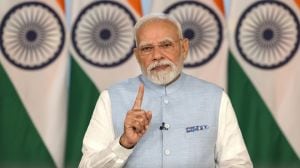Advani goes back to the future vowing to protect ‘Hindu’ India
In a hard-hitting speech that could well have been penned by Pravin Togadia, BJP president L K Advani today declared his party’s unambi...

In a hard-hitting speech that could well have been penned by Pravin Togadia, BJP president L K Advani today declared his party’s unambiguous commitment to the idea of a ‘‘Hindu’’ India and warned, ‘‘if anybody tries to take the cover of secularism to indulge in anti-Hindu politics and statecraft, the BJP will stand in their path like a rock, prepared to make any sacrifice.’’
The cornerstone of Advani’s opening speech at the three-day BJP national executive that began here this evening was a no-holds barred attack on ‘‘pseudo-secularism’’ and assertion of India’s Hindu ethos—outlined in much stronger terms than even during his Rath Yatra days in 1990.
He made it clear that the arrest of the Shankaracharya had provided the BJP with the same opportunity for ideological ‘‘mass mobilisation’’ as the Ayodhya issue had done in the 1980s and 90s.
Advani said the pontiff’s incarceration was a result of ‘‘the general climate of pseudo-secularism in our country in which maligning of the Hindu faith, hurting of Hindu sentiments and denial of legitimate Hindu interests have been made the ultimate and sole criterion of one’s commitment to secularism.’’
|
Modi gets pride of place at rally
|
|||||
|
• RANCHI: In keeping with the BJP decision to return to Hindutva, Gujarat chief minister Narendra Modi found pride of place at the public rally held in the evening. Although he did not address the gathering, he was the only ‘‘national leader’’ other than Advani and Vajpayee on the stage. |
|||||
He then posed four questions:
• ‘‘Why did the then Congress government at the Centre apologise to a certain Muslim seminary in UP when in 1994 the IB had to conduct a raid on a hostel inside the seminary to nab suspected ISI-backed terrorists?’’
• ‘‘What would happen if a Central minister were to say at a public meeting that he is ashamed of being a Muslim or a Christian?’’
• ‘‘Why is raising one’s voice against fraudulent conversions of poor tribals and other indigent people considered a communal act in this country?’’
• ‘‘Who has created this bizarre and perverse intellectual atmosphere in this country where anything associated with Hinduism, Hindu ethos and Hindu faith is considered communal, obscurantist and—my blood boils when I hear the term—toxic?’’
He went on to state: ‘‘The time has come to proclaim, and proclaim with all the courage of our conviction, that India is secular principally because of its Hindu ethos. Remove this Hindu ethos, and there will be no India left.’’
Advani accused a section of the Congress, the Communists and some other political forces in the country of ‘‘conspiring to slowly but systematically erase the Hindu ethos of this country and to obfuscate the basic Hindu identity of our culture and civilisation.’’
It was in order to fight anti-Hindu politics that the BJP, ‘‘after a lot of inner-party deliberation’’ decided to take up the Shankaracharya issue, Advani admitted.
‘‘By launching the relay hunger strike and dharna on November 20, we have begun a campaign through which, as in the Ram Janmabhoomi issue, we will powerfully counter our ideological and political adversaries, reaffirm the meaning of genuine secularism, strengthen national unity, and rededicate ourselves to the adoption of life-enriching dharmic values in society, politics and statecraft.’’
The repeated use of the word ‘‘statecraft’’ is significant because the BJP, unlike the VHP and RSS, had so far maintained that while Hinduism sustained Indian society, the state should be secular.
Advani’s speech indicated that following the diktat issued by the RSS at its Haridwar meeting earlier this month, the BJP too was ready to openly fall in line with the idea of a ‘‘Hindu rashtra.’’
Photos





- 01
- 02
- 03
- 04
- 05

























